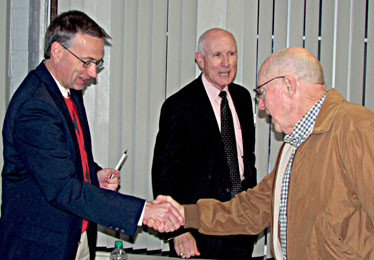Local legislators hold meeting with public

Photo courtesy Greg Oliver
State Rep. Davey Hiott of Pickens, left, is greeted by Central resident and former Pickens County Council chairman Bob Nash following the annual Pickens County Legislative Delegation meeting last week in Easley. Also pictured is State Rep. Gary Clary of Clemson.
Residents express concerns on topics
including education, business, roads
 By Ben Robinson
By Ben Robinson
Staff Reporter
brobinson@thepccourier.com
EASLEY — The members of the Pickens County legislative delegation held their annual public meeting last Thursday at the Carr Center of West End Hall in Easley.
The delegation — consisting of state senators Larry Martin of Pickens and Thomas Alexander and state representatives Gary Clary, Davey Hiott, Neal Collins and Joshua Putnam — heard from a number of residents about their concerns heading into the 2015 session of the South Carolina General Assembly, which began Tuesday in Columbia.
Pickens resident Johnelle Raines of Parents Involved in Education said after many complaints from parents, the state moved from requiring Common Core standards in South Carolina schools, but she said when she reads actual state documents, it is obvious what happened.
“It became painfully obvious this was just a rebranding,” Raines said. “The new standards are exactly the same, word for word.”
Raines asked for the delegation’s help in the matter.
“We are asking that each of you make sure the department of education understands that this is not acceptable,” Raines said.
On a personal note, Raines asked the delegation to continue efforts to make abortion illegal in South Carolina.
She also encouraged legislators to restore funding for education to levels required by law.
“This is forcing local school boards to raise taxes,” Raines said. “This is not acceptable to we the people. We are taxed enough already.”
Raines reminded the legislators that they depend on people to remain in office.
“We the people are your boss, not the other way around,” she said. “Remember your oath to protect, preserve and defend the Constitution. You all pledged that before God. Your vote should reflect your promise to God.”
Junius Smith, president of Conservatives of the Upstate, stood to criticize the school board’s building project, saying the board will end up paying millions just in interest. He also said the time set for replacement of school roofs is 12 and a half years.
Smith said the board could go to a local hardware store and purchase shingles guaranteed for 20, 30 or even 40 years.
New school board member Henry Wilson spoke up, saying the board is always reacting to some “barking dog” complaining about its finances.
Smith stood and said, “I am not a dog!”
Wilson continued, saying the board now has worked together briefly.
“We need to work together,” Wilson said. “Our focus has got to be graduating the most hirable kids in the country.”
School board member Alex Saitta stood to address the district’s money problems.
“The next few months, you will hear a lot of calls to spend more money on this or more money on that,” Saitta said. “As always, there will never be enough money. At some point, the focus needs to be on reducing unreasonable spending. If we can reduce that, we can redirect that money toward core services.”
Saitta shared one problem the district is facing.
“For example, state law gives school district employees 12 to 15 paid sick days a year,” Saitta said. “That’s beyond the norm. It is also unfair to ask taxpayers — who maybe get five paid sick days a year — to pay for government employees to get 12 to 15 paid sick days.
“This is in addition to breaks and holidays and vacations that full-time employees are given,” Saitta continued. “There are so many sick days given under the law that our school district pays employees a bonus for not using them. Each year the district pays out about $300,000 in bonuses to employees leaving the district or retiring for sick days not used, but accumulated.”
Saitta said that conflicts with the district’s true mission.
“That’s education money spent on those bonuses that could better be used redirected to instruction, the classroom or paying existing employees,” Saitta said. “Another example: by law, the district has to pay some employees medical coverage for working as little as 15 hours a week. Others as little as 20 hours a week.
“Like the sick day law, this may have made sense years ago, but things have changed,” Saitta continued. “I would raise it to at least 24 hours, if not 30 hours a week. Again, it is unfair to ask taxpayers to pay for medical coverage for government employees working 15 and 20 hours a week, when they have to work 30 hours a week to get coverage themselves. Those are two examples of laws that need to be changed, so school districts free up money that can be redirected to instruction, the classroom or existing employee pay.”
Garvin Bolding, a Six Mile resident, said he has always been an advocate of public education. But Bolding criticized the state legislature for how they handled the passage of the state lottery in the early 2000s, putting the money toward higher education when he said it should have gone to alternative education programs.
Bolding added school districts have become too concerned over buildings rather than educating children.
“It’s all about bricks and mortar,” he said. “They came back with a new school everywhere and showed no intellectual capacity to study this as far as what we needed compared to what we got. I’m angry and confused about this.”
Another issue residents asked legislators to address is funding for road maintenance.
Local resident Steve Haney told the delegation the state’s roads are crumbling.
“We need to restructure how roads are funded because the (South Carolina Department of Transportation) doesn’t get to have the final say on where the money goes,” Haney said. “I would like to see you guys revamp how roads are funded in this state, and until you pay 100 percent of the money for road maintenance, don’t even think of raising the gas tax.”
But Robert Sams argued the state has been well below other states since there hasn’t been a gas tax increase in nearly three decades.
“We’ve been putting up with poor conditions of roads for far too long,” Sams said.
Local resident Rusty Smith said he is opposed to fee in lieu of tax agreements that governments, like Pickens County, use as incentives to attract industry.
“It is good to give incentives to get business and industry in here, but giving them an unfair advantage and having them come before the school board and say, ‘Raise all the business taxes, but not ours,’ is crony capitalism,” he said.
In addition, Wayne Atkinson said he is concerned over the Order of Protection bill being proposed by Martin to address domestic violence — a problem in which South Carolina ranks second nationally in the number of women murdered by men.
“We have laws, but they don’t stop everything,” Atkinson said. “If we make it so that people can’t get a weapon, what’s to stop them from getting a knife. Forty percent of fatalities in this state is due to DUI, but a person convicted of DUI can still drive a car.”
Martin said the bill is the same provision Louisiana Gov. Bobby Jindal signed into law last spring.
“It says you can’t own a weapon for a year after you’re convicted of domestic violence,” Martin said. “There’s no registration, but we’ve got to do something. You have to separate yourself from your weapon at the time of sentence and then you can either give it to a third party for safe keeping. But if you keep possession of a weapon anyway, you’re charged with a felony.
“I’m trying to do something that’s a terrible stigma the state faces year after year of being one of the highest in the nation in domestic violence.”
Hiott said following the meeting that he feels the current legislative sessionwill address a number of issues over the next five months.
“It’s going to be very busy,” Hiott said. “Looking at the prefiled bills, there’s not going to be any down time and every issue described tonight, I believe, is prefiled. … It’s going to be a very busy session, but a productive session.”
Greg Oliver of The Journal contributed to this article.




























